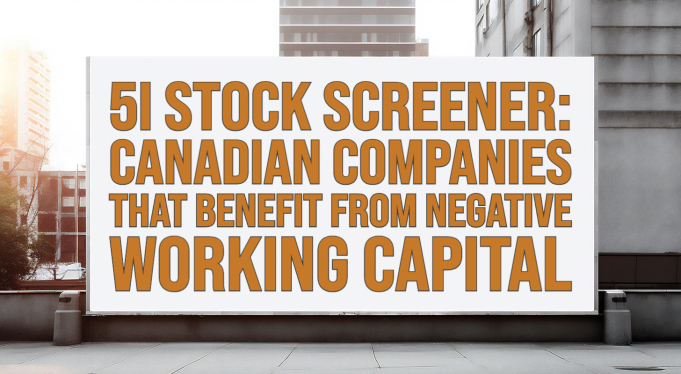What does negative working capital mean?
Negative working capital means a company’s short-term assets are less than its short-term liabilities. What this financial metric indicates is that the company collects cash from customers in advance before it needs to deliver any of its goods or services or pay suppliers.
Why is it a sign of great business?
Of course, negative working capital could be a sign of financial difficulty if the company’s fundamentals are deteriorating. For example, if sales and earnings decline year after year, the company struggles to generate cash flow, and the company also has a high leverage profile, then negative working capital could signal near-term trouble for the company.
However, there is a small group of businesses that have a superior business model or strong competitive position in the value chain, which helps them negotiate better payment terms. These characteristics allow the company to be extremely cash generative, while at the same time maintaining steady growth in revenue and earnings over the years.
For instance, a software company, or cable company where customers usually pay annual subscription fees in advance before the company needs to provide any service. Or a retailer that sells merchandise and collects cash well before it needs to pay its suppliers for the inventory, etc.
A few prominent benefits that negative working capital provides such as:
- For a typical business, the more it grows the more capital it needs, but for these businesses the more it grows the more capital it provides. In effect, the growth of the company is funded by stakeholders (customers, suppliers), reducing the needs and risks to raise more equity (diluting shareholders) or debt (less leverage) to grow the business.
- Usually, companies with these profiles do provide critical products and services, where demand for these products/services is recurring in nature. As a result, the underlying businesses produce a stable, predictable stream of cash.
- Solid signal of a strong competitive position as the company can demonstrate negotiation power over its suppliers
- The funds that are collected in advance could be deployed for share repurchases, dividends or acquisitions which are beneficial to shareholders
In contrast to the conventional wisdom, which suggests that a company may be too aggressive in managing working capital, or outlier risks such as the pandemic or a recession could put the company into financial trouble. These characteristics, if maintained steadily year after year are the signs of truly great businesses, and there are not many companies possessing these profiles that are publicly traded.
Below we have screened for companies with the following criteria:
- Negative working capital
- Market cap larger than $100 million
- Revenue growth in the last five years of at least 10% annually
- Net debt/EBITDA less than 4.0x
The criteria above measure a company’s working capital profile in the trailing twelve-month period that is negative. We prefer companies that are over $100 million in market cap, as these companies have proven themselves to be enduring, self-sustainable entities. In addition, we added one more filter to screen out highly leveraged businesses, as we are skeptical of companies that borrow too much debt.
Lastly, we screen for companies with average revenue growth over 5 years of at least 10% per annum. Because we think this screener only works well with companies that have a solid underlying growth over the years.
Here is the screener:
|
A quick reminder that we exclude the Energy sector in this screener as most names in the Energy space have experienced an abnormal tailwind due to energy prices in the last two years. Also, the underlying business is not predictable, or recurring enough. As a result, negative working capital in these names is a temporary financial position rather than a sustainable one.
Members will recognize some of the names that we cover in our Model Portfolios and coverage lists such as Constellation Software Inc. (CSU), Boyd Group Services Inc. (BYD) and Capital Power Corporation (CPX).
Again, these companies on the list are not recommendations, but rather a starting point that helps investors generate potential investment ideas and strategies. Investors can view our previous screener blog here.
Take Care,

Disclosure: The analyst(s) responsible for this report do not have a financial or other interest in the securities mentioned.






Comments
Login to post a comment.